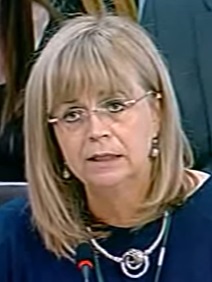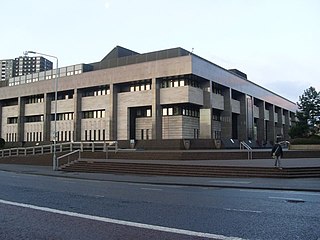Bona vacantia is a legal concept associated with property that has no owner. It exists in various jurisdictions, with consequently varying application, but with origins mostly in English law.
In England and Wales, Northern Ireland and most Commonwealth and colonial governments, the chief law officer of the Crown is the Attorney General.

Her Majesty's Advocate, known as the Lord Advocate, is the chief legal officer of the Scottish Government and the Crown in Scotland for both civil and criminal matters that fall within the devolved powers of the Scottish Parliament. He or she is the chief public prosecutor for Scotland and all prosecutions on indictment are conducted by the Crown Office and Procurator Fiscal Service, nominally in the Lord Advocate's name.

A sheriff court is the principal local civil and criminal court in Scotland, with exclusive jurisdiction over all civil cases with a monetary value up to £100,000, and with the jurisdiction to hear any criminal case except treason, murder, and rape which are in the exclusive jurisdiction of the High Court of Justiciary. Though the sheriff courts have concurrent jurisdiction with the High Court over armed robbery, drug trafficking, and sexual offences involving children, the vast majority of these cases are heard by the High Court. Each court serves a sheriff court district within one of the six sheriffdoms of Scotland. Each sheriff court is presided over by a sheriff, who is a legally qualified judge, and part of the judiciary of Scotland.
An advocate general is a senior officer of the law. In some common law and hybrid jurisdictions the officer performs the function of a legal advisor to the government, analogous to attorneys general in other common law and hybrid jurisdictions. By contrast, in the European Union and some continental European jurisdictions, the officer is a neutral legal advisor to the courts.

Dame Elish Frances Angiolini is a Scottish lawyer. She was the Lord Advocate of Scotland from 2006 until 2011, having previously been Solicitor General since 2001. She was the first woman, the first Procurator Fiscal, and the first solicitor to hold either post. Since September 2012, Angiolini is the Principal of St Hugh's College, Oxford. She is a Pro-Vice-Chancellor of the University of Oxford and Chancellor of University of the West of Scotland. Since leaving office she has led several investigations and inquiries, including a review of deaths in police custody commissioned by the then-Home Secretary Theresa May.

A procurator fiscal, sometimes called PF or fiscal, is a public prosecutor in Scotland. They investigate all sudden and suspicious deaths in Scotland, conduct fatal accident inquiries and handle criminal complaints against the police. They also receive reports from specialist reporting agencies such as Her Majesty's Revenue and Customs.

A fatal accident inquiry is a Scottish judicial process which investigates and determines the circumstances of some deaths occurring in Scotland. Until 2009, they did not apply to any deaths occurring in other jurisdictions, when the Coroners and Justice Act 2009 extended the Fatal Accidents and Sudden Deaths Inquiry (Scotland) Act 1976 to service personnel at the discretion of the Chief Coroner or the Secretary of State. The equivalent process in England and Wales is an inquest. A major review of the fatal accident inquiries was undertaken by Lord Cullen of Whitekirk, at the request of the Scottish Government, which resulted in the passing of the Inquiries into Fatal Accidents and Sudden Deaths etc. (Scotland) Act 2016.

Precognition in Scots law is the practice of taking a factual statement from witnesses by both prosecution and defence after indictment or claim but before trial. This is often undertaken by trainee lawyers or precognition officers employed by firms; anecdotal evidence suggests many of these are former policemen.

Glasgow Sheriff Court is a Sheriff Court in the Gorbals (Laurieston) area of Glasgow, within the Sheriffdom of Glasgow and Strathkelvin. It is reputedly the busiest court in Europe.
Jimmy McDougall was Procurator Fiscal in Dumfries when Pan Am Flight 103 crashed at Lockerbie, Scotland, on 21 December 1988 killing all 243 passengers and 16 crew on board, as well as 11 people in the town of Lockerbie.
Crime in the United Kingdom describes acts of violent crime and non-violent crime that take place within the United Kingdom. Courts and police systems are separated into three sections, based on the different judicial systems of England and Wales, Scotland, and Northern Ireland.
The term Crown Attorney's Office is the title for the various public prosecution offices under the jurisdiction of the province of Ontario. Each Ontario Superior Court of Justice has its own Crown Attorney's Office, which conducts all criminal trial prosecutions and summary conviction appeals for cases that the province is responsible for in that court's geographical area. The numerous Crown Attorney Offices, along with the Crown Law Office - Criminal and various specialized offices forms the Criminal Law Division of the Attorney General of Ontario, under the immediate supervision of the Division's Assistant Deputy Attorney General of Ontario.

Francis Mulholland, Lord Mulholland, is a Scottish judge who has been a Senator of the College of Justice since 2016. He previously served from 2011 to 2016 as Lord Advocate, one of the Great Officers of State of Scotland and the country's chief Law Officer, and as Solicitor General, the junior Law Officer.
An inquest is a judicial inquiry in common law jurisdictions, particularly one held to determine the cause of a person's death. Conducted by a judge, jury, or government official, an inquest may or may not require an autopsy carried out by a coroner or medical examiner. Generally, inquests are conducted only when deaths are sudden or unexplained. An inquest may be called at the behest of a coroner, judge, prosecutor, or, in some jurisdictions, upon a formal request from the public. A coroner's jury may be convened to assist in this type of proceeding. Inquest can also mean such a jury and the result of such an investigation. In general usage, inquest is also used to mean any investigation or inquiry.

A fiscal fine is a form of deferred prosecution agreement in Scotland issued by a procurator fiscal for certain summary offences as an alternative to prosecution. Alternatives to prosecution are called direct measures in Scotland.
A specialist reporting agency is an organisation other than the Police Service of Scotland who report alleged crimes to the Procurators Fiscal in Scotland. These include HM Revenue and Customs, Health and Safety Executive, the Scottish Environment Protection Agency, the Maritime and Coastguard Agency and Trading Standards departments of local authorities.

The Court of the Lord Lyon is a standing court of law which regulates heraldry in Scotland. The Lyon Court maintains the register of grants of arms, known as the Public Register of All Arms and Bearings in Scotland, as well as records of genealogies.

Lesley Thomson was the Solicitor General for Scotland from 2011 to 2016, one of the two law officers of the Scottish Government. She was appointed to the office on 19 May 2011, after the Scottish Parliament election, succeeding Frank Mulholland who was promoted to Lord Advocate.








